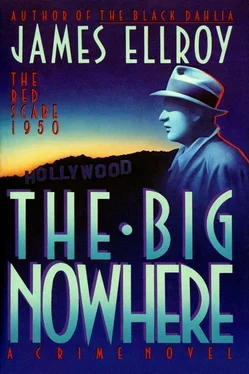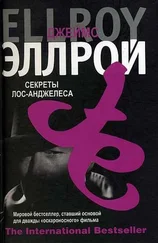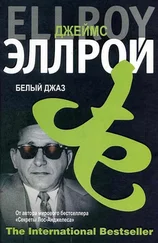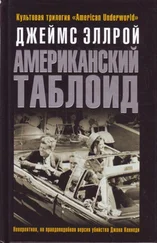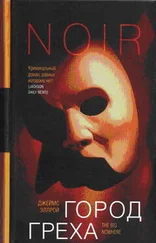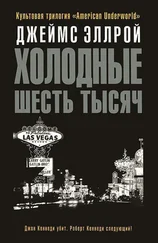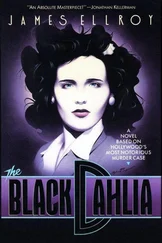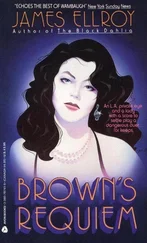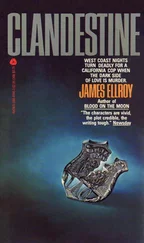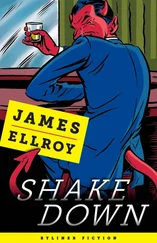Buzz let Lesnick catch some breath — and cut to Coleman. “And the reason you didn’t kick loose with Loftis’ file from ’42 to ’44 was because Coleman was smeared all over it. That right?”
Lesnick said, “Yes. It would have meant much unnecessary suffering for Reynolds and Coleman. Before I turned the files over in toto I checked for other Coleman references. Chaz Minear alluded to Coleman, but only elliptically, so his file I relinquished. I did that same sort of editing when I gave my files to the HUAC investigators, but I lied and told them the Loftis file had been lost. I didn’t think Ellis Loew would believe that lie, so I just secreted Reynolds’ file portion and hoped I would die before they asked me for it.”
“Why didn’t you just chuck the damn thing?”
Lesnick coughed and hunched deeper into his robe. “I had to keep studying it. It compelled me greatly. Why did you leave the grand jury? Was it moral qualms over Ellis Loew’s methods?”
“I just didn’t think UAES was worth the trouble.”
“Your statement on the newspapers gives you credibility, and I find myself wondering exactly how much you know.”
Buzz shouted over a sudden crash of waves. “I worked the killings and the grand jury! What I don’t know is the history!”
The ocean noise subsided; Lesnick coughed and said, “You know all...”
“Doc, I know the incest stuff, and the plastic surgery and all about Coleman tryin’ to frame his daddy. The only other guy who knew was that DA’s captain who was killed at the jazz club. And I think you wanta tell what you got, or you wouldn’t of pulled that juvenile ‘Trotsky’ number. Make sense, headshrinker?”
Lesnick laughed, coughed, laughed. “You understand the concept of subliminal motivation, Mr. Meeks.”
“I got a half-assed brain, boss. Wanta hear my theory why you held the files back from summer ’49 on?”
“Please expound.”
“The UAESers who knew were talkin’ about Reynolds and Claire gettin’ married and how Coleman would take it. That right?”
“Yes. I was afraid the investigators would seize the Coleman references and try to locate him as one of their friendly witnesses. Claire tried to keep news of the wedding out of the papers so Coleman wouldn’t see it, but she did not succeed. At a terrible price, as I’m sure you know.”
Buzz stared at the water, stone quiet: his favorite trick to open suspects up. After a minute or so, Lesnick said, “When the second two victims were reported in the scandal tabloids, I knew the killer had to be Coleman. He was my analysand during the SLDC time. I knew he would have to be living somewhere near the Central Avenue jazz clubs, and I located him. We were close once, and I thought I could reason with him, get him to a locked institution and stop his senseless slaughter. Augie Duarte proved me wrong, but I tried. I tried . Think of that before you judge me too harshly. ”
Buzz looked at the walking dead man. “Doc, I’m not judgin’ anybody in this fuckin’ thing. I’m just leavin’ town in a day or so, and I sure would like you to fill in what I don’t know.”
“And nobody else will be told?”
Buzz threw Lesnick some crumbs. “You tried to spare your friends grief while you played the game, and I’ve pulled tricks like that too. I’ve got these two friends who’d like to know why, but they ain’t ever gonna. So could you maybe just tell me?”
Saul Lesnick told. It took him two hours, with many long pauses to suck in air and keep himself fueled. Sometimes he looked at Buzz, sometimes he looked out at the ocean. He faltered at some of the worst of it, but he always kept telling.
1942.
Wartime blackouts in LA, 10:00 P.M. curfew. Coleman was nineteen, living on Bunker Hill with his crazy mother Delores and two of his quasi-sisters. He used the surname “Masskie” because slave breeder mommy needed a paternal monicker to get Relief payments for her son and the seven letters jibed with Sister Aimee’s dictates on numerology. Coleman dropped out of Belmont High when they wouldn’t let him play in the school band; he was heartbroken when the band teacher told him the stupid saxophone flubbing he did was just noise that indicated no talent, only strong lungs.
Coleman tried to join the army two months after Pearl Harbor; he flunked the physical on trick knees and a spastic colon. He passed out handbills for Angelus Temple, earned enough money to buy himself a new alto sax and spent hours running chords and improvisational charts that sounded good only to him. Delores wouldn’t let him practice at home, so he took his horn to the Griffith Park hills and honked at the squirrels and coyotes and stray dogs that trucked there. Sometimes he walked to the downtown library and listened to Victrola records with earphones. His favorite was “Wolverine Blues,” sung by an old coon named Hudson Healy. The jig mushed words, and you could hardly hear him; Coleman invented his own words, dirty stuff about wolverines fucking, and sometimes he sang along under his breath. He listened to the record so much that he wore down the grooves to where you could hardly hear anything, and he started singing a little bit louder to make up for it. Finally, the old biddy who ran the Victrola Room got wind of his lyrics and gave him the boot. For weeks he jerked off to fantasies of Coleman the Wolverine butt raping her.
Delores kept bothering Coleman for Sister Aimee money; he took a job at the Joredco Dental Lab and gave her a percentage tithe. The work was pulling animal teeth out of decapitated trophy heads, and he loved it. He watched the more skilled workers make dentures with the teeth, fashioning plastic and mortar paste into choppers that could bite for eternity. He stole a set of bobcat plates and played with them when he honked his sax up in the hills. He pretended he was a bobcat and that Delores and his phony brothers and sisters were afraid of him.
Joredco laid Coleman off when the boss found a wetback family who’d work for an extra-low group rate. Coleman was hurt and tried to get a job at a couple of other dental labs, but found out Joredco was the only one that made dentures with real animal teeth. He took to prowling around after dark — real dark — everybody shut in behind blackout curtains so the Japs wouldn’t see all the lights and do LA like they did Pearl Harbor.
Coleman composed music in his head while he prowled; curiosity about life behind the curtains almost drove him crazy. There was a list on the wall at a local barber shop: Bunker Hill citizens who were good citizens working defense jobs. The list said who was working days, swing and graveyard. Coleman took the names to the phone book and matched them to addresses; from there he made phone calls — a phony census poll — and figured out who was married and who wasn’t. Unmarried and graveyard meant a Coleman foray.
He forayed a bunch of times: in through an unlocked window, busting open a woodbox door, sometimes chiseling a door jamb. He took little things and money to keep Delores off his back. His best catch was a stuffed bobcat. But Coleman liked just being in the empty houses best. It was fun to pretend to be an animal that could appreciate music. It was fun to pretend to be an animal that could appreciate music. It was fun to be in dark places and pretend you could see in the dark.
Early in June, Coleman was on the Hill Street trolley and heard two guys talking about a strange-o named Thomas Cormier and the smelly animals he kept behind his house on Carondelet. One man recited the names: weasels, ferrets, badgers, otters and wolverines. Coleman got excited, census-called Thomas Cormier and learned he worked nights at the Griffith Park Zoo. The next night, armed with a flashlight, he visited the wolverines and fell in love with them.
Читать дальше
